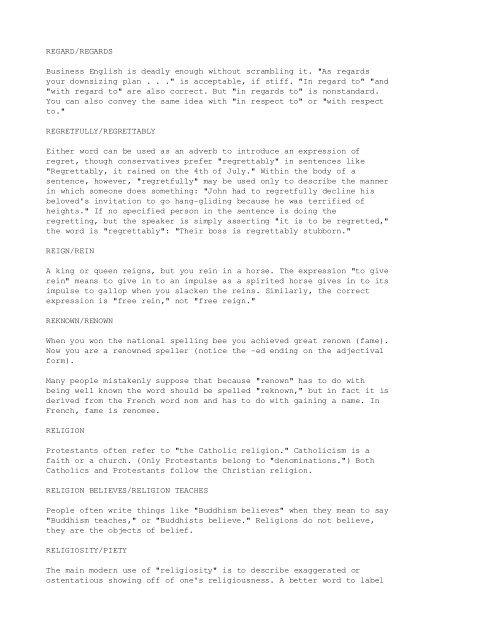Common_Errors_in_English_usage
Common_Errors_in_English_usage
Common_Errors_in_English_usage
Create successful ePaper yourself
Turn your PDF publications into a flip-book with our unique Google optimized e-Paper software.
REGARD/REGARDS<br />
Bus<strong>in</strong>ess <strong>English</strong> is deadly enough without scrambl<strong>in</strong>g it. "As regards<br />
your downsiz<strong>in</strong>g plan . . ." is acceptable, if stiff. "In regard to" "and<br />
"with regard to" are also correct. But "<strong>in</strong> regards to" is nonstandard.<br />
You can also convey the same idea with "<strong>in</strong> respect to" or "with respect<br />
to."<br />
REGRETFULLY/REGRETTABLY<br />
Either word can be used as an adverb to <strong>in</strong>troduce an expression of<br />
regret, though conservatives prefer "regrettably" <strong>in</strong> sentences like<br />
"Regrettably, it ra<strong>in</strong>ed on the 4th of July." With<strong>in</strong> the body of a<br />
sentence, however, "regretfully" may be used only to describe the manner<br />
<strong>in</strong> which someone does someth<strong>in</strong>g: "John had to regretfully decl<strong>in</strong>e his<br />
beloved's <strong>in</strong>vitation to go hangglid<strong>in</strong>g because he was terrified of<br />
heights." If no specified person <strong>in</strong> the sentence is do<strong>in</strong>g the<br />
regrett<strong>in</strong>g, but the speaker is simply assert<strong>in</strong>g "it is to be regretted,"<br />
the word is "regrettably": "Their boss is regrettably stubborn."<br />
REIGN/REIN<br />
A k<strong>in</strong>g or queen reigns, but you re<strong>in</strong> <strong>in</strong> a horse. The expression "to give<br />
re<strong>in</strong>" means to give <strong>in</strong> to an impulse as a spirited horse gives <strong>in</strong> to its<br />
impulse to gallop when you slacken the re<strong>in</strong>s. Similarly, the correct<br />
expression is "free re<strong>in</strong>," not "free reign."<br />
REKNOWN/RENOWN<br />
When you won the national spell<strong>in</strong>g bee you achieved great renown (fame).<br />
Now you are a renowned speller (notice the ed end<strong>in</strong>g on the adjectival<br />
form).<br />
Many people mistakenly suppose that because "renown" has to do with<br />
be<strong>in</strong>g well known the word should be spelled "reknown," but <strong>in</strong> fact it is<br />
derived from the French word nom and has to do with ga<strong>in</strong><strong>in</strong>g a name. In<br />
French, fame is renomee.<br />
RELIGION<br />
Protestants often refer to "the Catholic religion." Catholicism is a<br />
faith or a church. (Only Protestants belong to "denom<strong>in</strong>ations.") Both<br />
Catholics and Protestants follow the Christian religion.<br />
RELIGION BELIEVES/RELIGION TEACHES<br />
People often write th<strong>in</strong>gs like "Buddhism believes" when they mean to say<br />
"Buddhism teaches," or "Buddhists believe." Religions do not believe,<br />
they are the objects of belief.<br />
RELIGIOSITY/PIETY<br />
The ma<strong>in</strong> modern use of "religiosity" is to describe exaggerated or<br />
ostentatious show<strong>in</strong>g off of one's religiousness. A better word to label





